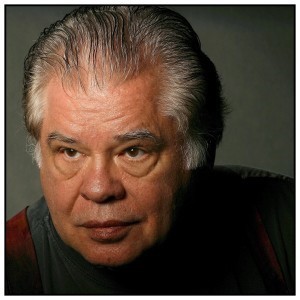Clayton Eshleman: From 'Penetralia' (forthcoming): 'Orphic Ontologies'

for Matthew Eshleman
Are you, Muse, the spume off Laussel, archaic
dust dimpled & savory that I nourish to steel myself
against
the Selfhood that lays claim to all rapture?
Is your fertility still based in the blood-filled bison horn
Laussel grasps in her right hand raised slightly below her
head?
Might the egg-shaped relief of a double figure near
Laussel
be a Paleolithic premonition of the serpent-encircled
Orphic egg?
Greeks believed that at death a man’s spinal marrow
emerged from his loins in serpent form.
Since bones are the framework of life,
the semen-like marrow in the skull was for centuries
thought to be the source of semen.
Thus the singing skull, the oracular skull,
an archosis going back to brain-eating Australopithecus
erectus.
In every desire a uterus shelved with skulls.
I released the energy from the gateless gate of a rock
face.
The wonder of inhabited nothingness bubbled & waned
in me, microscopic doodad.
Then I heard manticores chortling with their triple
band-saw mouths--
or was I hearing the love-songs of Max Beckmann?
Ochre dots circulating around a breast-like wall
protuberance in Le Combel
bearing in their menstrual, apotropaic sigils the
presence of Cro-Magnon woman
embedded so deep in collective mind
I can only wonder if planetary peril is not inscribed
in image’s beginnings.
Is our war on animals a planetary cannibalization to
reach non-existence
in a masque performed by hydrogen mountains &
sulfur assassins?
The torn heaven tent draped over our lightmares.
Blake under covers at night. As if an anaconda entered
as I tried to sleep
&wept insomnia into every shutter of my piles.
Hades is the king of remembered images.
Orpheus did bring Eurydice back. He couldn’t bring
her THROUGH.
To keep images in the embrace of each other &
maintain the intercourse of their self-revealing
conversations.
The artist is neither revolutionary nor conservative,
but a worker of the in-between, a messenger from
the centerless flux.
Is anything left of the beginning?
How about the soul’s dragonfly metastases?
Or the petrified lightning rampant in a bear?
A sloth in a skin-tight body hose of drowned men.
After a vaporized storm, glassy eyes float about,
burial mounds invading the bolted stars.
Rainer Marie Rilke to Lotte Hepner, November 8, 1915: “When a tree blossoms, death as well as life blossoms in it, and the field is full of death, which from its reclining face sends forth a rich experience of life, and the animals move patiently from one to another—and everywhere around us, death is at home, and it watches us out of the cracks of things, and a rusty nail that sticks out of a plank somewhere, does nothing day and night except rejoice over death.”
At the core of our Milky Way galaxy:
animal eyes in a blackish, red density of dust clouds,
horns in smears of light.
As if life on earth is anticipated in this 300 light-years
panorama.
Coitus as the earthly version of cosmic superimposition.
Sciomantic penetrations course a vineyard.
At times I see miles of pools, piles of pumas sunning
their scorpion sores,
four boars mating in a silken anguish.
Or are we all animals of snow, impelled by that first
avalanche of mother milk,
haloed by circumpolar whiteness?
James Hillman writes that “Soul is vulnerable and suffers; it is passive and remembers, It is water to the spirit’s fire, like a mermaid who beckons the heroic spirit into the depths of passions to extinguish its certainty. Soul is imagination, a cavernous treasury—to use an image from St. Augustine—a confusion and richness, both.”
In sleep’s porphyry mist, Daphne’s lauraceous hues.
A nude asleep in a water-lily harness rotating through
my breakfast. Drink from this tambourine.
The portentous, alpine edges in every doorway.
[N.B. The preceding will appear next year in Eshleman’s new collection, Penetralia, from Black Widow Press, which will also publish Clayton Eshleman / The Essential Poetry this fall. A third major publication, scheduled for December by Wesleyan University Press, is A Sulfur Anthology, in celebration of Eshleman’s great magazine of the 1980s & 90s. Entering a new decade in his life he remains a poet of enormous power & range, always provoking those powers to their very limits. In a previous posting I wrote: “In my writings over the years, the work of certain contemporaries, like that of multiple generations of forerunners, has given me a series of touchstones against which to test my own ideas & powers as a poet. … With Eshleman, as with other contemporaries, a kind of dialogue remains ongoing & mutual: an interchange that has spanned nearly five decades & has fueled moves on my part, & possibly on his, that would have been impossible without such interaction. … I believe that Clayton, at an early point, had made the decision to be totally relentless in his calling as a poet, & I came to prize that relentlessness & his determination to pursue a poetry that would take him to his limits – & us along with him. There is with that a singular intelligence that emerges in the way he comes at a subject, an idea or an experience, & gives it an unexpected shape & meaning. Along with this he also – like the best of us – draws from the full range of what he can discover in the world, through his own observation or from that of others.” (J.R.)]
Poems and poetics